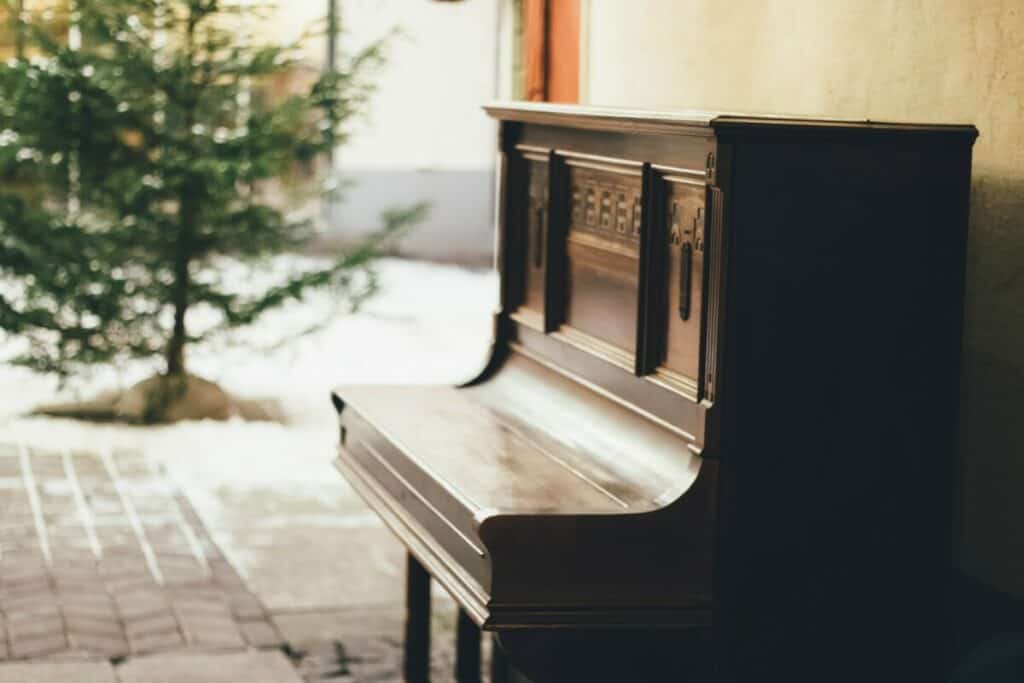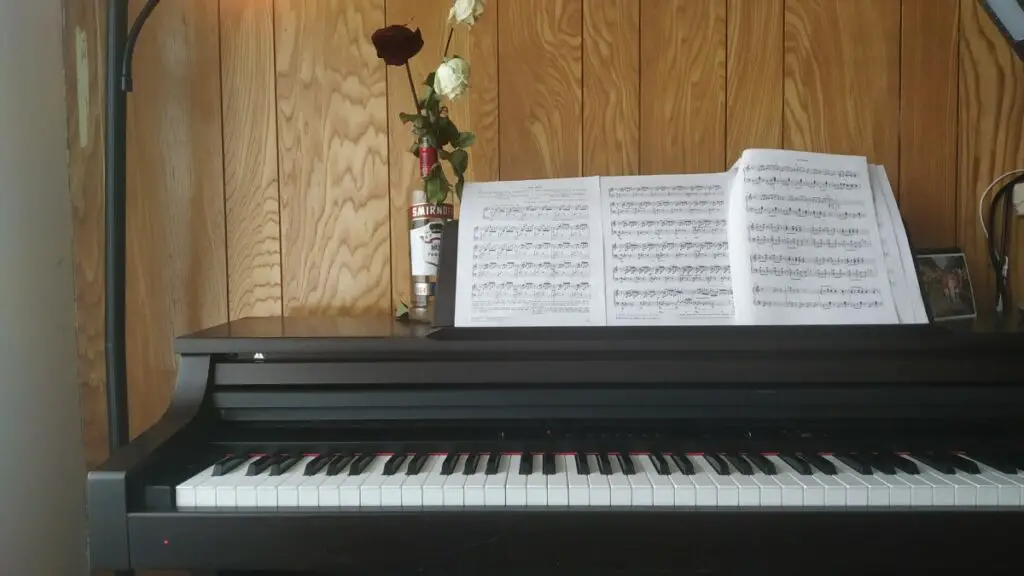This post contains affiliate links.
You may have seen videos on the Internet of small toy grand pianos and think that it’ll be a cute fit for your child. Well, think twice because depending on how old your child is, using a toy piano won’t help your child learn how to play the piano properly.
Kids under the age of 5 can play around with toy pianos. However, you shouldn’t let older kids learn the piano with toy pianos as they have a limited amount of keys, bad sound quality and unweighted keys, which can prevent proper piano techniques development. Buy an electric keyboard instead.

Continue reading to find out why toy pianos are fine for kids under the age of 5, why you should buy an electric piano keyboard instead of a toy piano, and why you will ultimately have to buy an acoustic piano if you want your kid to learn the piano properly.
Reasons a toy piano is fine if your child is under the age of 5
A mind of a child under the age of 5 hasn’t developed enough for them to concentrate on learning or following instructions. Furthermore, their arms aren’t long enough to reach for further notes on a full-length piano keyboard and their fingers aren’t strong enough to press down on normal keys.
Think about it, a child that young can’t tell their right from left, let alone learn to read sheet music and play the piano accordingly!
This makes a toy piano a perfect choice for a child under the age of 5 since they can get started messing around with the notes and develop an early musical sense without the stress of taking piano lessons.
This is because a toy piano has at most 36 keys, the least amount of keys offered in a piano keyboard along with unweighted keys, making it easy for a child to press down upon.
How you can easily teach your kid to play the piano
Here’s a fun and easy family-bonding activity to do with your kid: you can watch these Youtube videos of easy simple piano tunes that even a person with 0 piano experience can play. Then play these tunes in front of your child so they can mimic you.
However, the cheap constructions of most toy pianos, terrible speakers and the fact that your child is growing quickly mean that you’ll need to upgrade to at least an electric piano keyboard soon.
An electric keyboard is better than a toy piano for learning the piano
If your child is over the age of 5, letting them play with toy pianos won’t help them develop proper piano techniques. At this age, their minds have developed enough to be able to concentrate on learning new things and their fingers are strong enough to easily press down piano keys.
Thus, they can start taking piano lessons and practice with an electric piano keyboard.
Electric keyboards are superior to toy pianos in every way. They have sturdier builds and better speakers that produce sounds similar to real acoustic pianos. Some models even have semi-weighted keys that somewhat mimic the feels of acoustic pianos.
When choosing an electric keyboard, you can choose to have 49, 61, 76 or 88 keys. To fully understand the differences between all of these options, check out What Octaves Are On a Piano Keyboard?
However, among all of these options, most people either choose 61 keys or the full 88 keys option. A 61 keys keyboard is fine for saving money and to see if your child likes the piano, but it’s better to invest in 88 keys right from the get-go.
The reason is that you will most likely hire a piano teacher for your child and the teacher will most likely have your child play classical pieces that are great for developing techniques. However, many classical pieces require 88 keys. Thus, 61 keys will restrict what pieces your child can play and you’ll eventually have to upgrade to 88 keys anyway.
For a budget electric keyboard with 88 keys, I recommend taking a look at the Alesis Recital 88:

When I first start learning to play the piano, this was the electric keyboard I bought. I bought it because, at its price range, the Alesis Recital 88 is the only keyboard with 88 keys, meaning I can play any piano piece I want to.
The sound of the keyboard in my opinion is decent enough for a kid beginner and the keys are semi-weighted. Although I still found it difficult to press the keys and play on an upright after practicing with this keyboard, I think semi-weighted keys are still better than keys that aren’t weighted at all.
The keyboard also has multiple sound options like bass, organ, or synth which is a nice bonus but isn’t too important for a beginner.
Note that the keyboard doesn’t come with a bench nor a stand so you have to buy those separately.
You can check out the Alesis Recital 88 here on Amazon (affiliate link)
How good are the expensive toy grand pianos
You may have seen toy pianos that look like mini versions of grand pianos:
Unlike most toy pianos that use speakers to play recorded sounds when keys are pressed, this toy grand piano use hammers to strike metal rods and create sounds, similar to how an acoustic piano works. Also, this toy piano is made of wood and looks better than toy pianos constructed using cheap plastics.
However, this toy grand still has fewer keys than an electric keyboard and with the money spent on this toy piano, you can get a Casio 61-keys keyboard that produces sounds more faithful to an acoustic piano.
Upgrade to an acoustic or digital piano for your child
Once you have confirmed that your child is passionate about the piano, you must get them either a digital piano or an acoustic piano as soon as possible.
This is because first of all, most electric keyboards have unweighted keys, making it harder to transition to acoustic pianos with fully weighted keys. Semi-weighted keys aren’t much better. I used to own an electric keyboard with semi-weighted keys and I still have a hard time getting used to weighted keys on a real piano.
Secondly, keys on electric keyboards are narrower than keys on acoustic pianos, making it easier for your child to accidentally play the wrong notes.
Finally, playing on unweighted keys doesn’t allow for dynamics, which is as important as being able to play all the notes in a piece correctly and in time, as dynamics lets pianist express their emotions by playing the piece softly or loudly at will. Without dynamics, the piece will sound dull and lifeless.
If you want to read more on the importance of weighted keys, check out Should Piano Keys Be Heavy?
Now, on which piano to get for your child, you should first learn what types of “real” pianos are available on the market. There are 3 types of pianos available on the market:
Grand pianos: the biggest type of piano constructed using the finest materials to produce the clearest and grandest sounds possible. Grand pianos are known for their black silhouettes, open lids and iconic curvatures and are primarily used in concerts or show up in movies.
The most well-known brand for grand pianos is Steinway, with some of their base model piano costing at least $100,000

Upright pianos: more commonly seen in homes, upright pianos also use strings and hammers like grand pianos to create sounds. However, instead of the strings and hammers being laid out flat horizontally in a grand piano, they are positioned vertically in an upright piano to save space.
This gives the upright piano its distinctive tall silhouette and its compact form factor, making it more portable and taking less space compared to a grand piano.

Digital pianos: don’t use strings and hammers to create sounds like acoustic pianos, instead it plays pre-recorded digital sounds when you press down on the keys. This is why digital pianos are shorter in height and are lighter compared to upright pianos.
With that said, digital pianos are designed to emulate the touch and feel of acoustic pianos, giving your child the playing experience and sounds just like the real thing. Also, note that there are grand and upright versions for digital pianos to choose from.
If you’re considering a digital piano for your child, I recommend looking into the Yamaha Clavinova line of digital pianos as they are excellent pianos with great sounds and solid key weights for reasonable prices. I own one myself and love practicing my piano pieces on it.

Between these 3 options, I recommend getting a digital piano for your child. This is because digital pianos don’t require tuning once a year like an upright or a grand does and so you save the money you would otherwise spend maintaining an acoustic piano.
The reason why it’s necessary to tune an upright or a grand at least once a year, is because playing an untuned piano can harm both the piano player and the piano itself. To read more on how an untuned piano harm the player and the piano, check out What An Untuned Can Do To Your Skills As A Pianist

